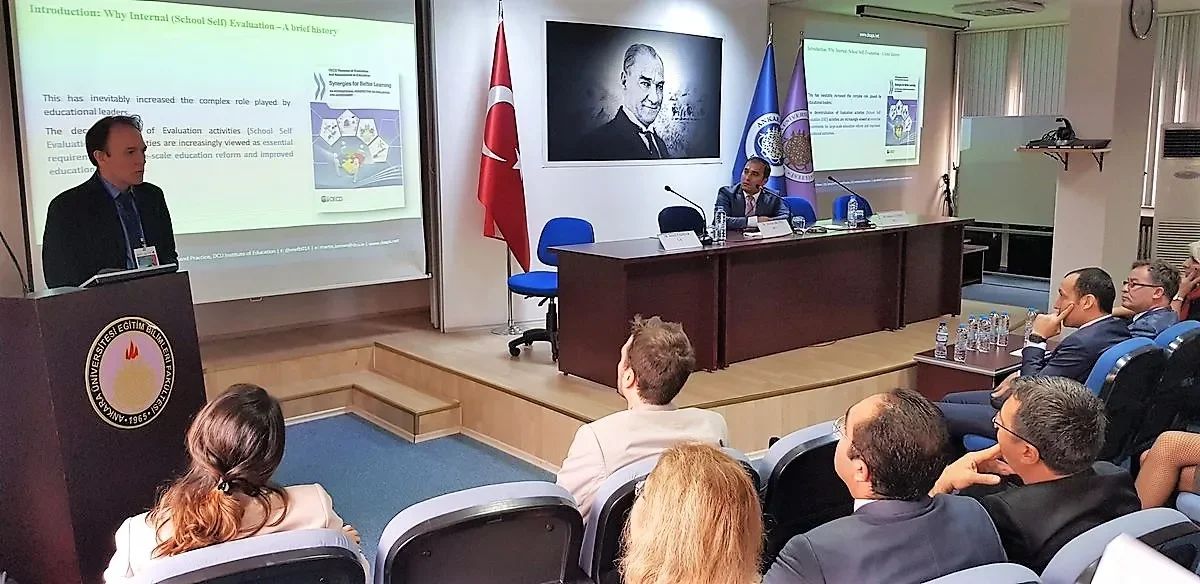

Making meaning of parent and student voice in School Evaluation
A report on a ground-breaking, European Union-funded project that explores the role of parents and students in school evaluation was launched at an international symposium on School Evaluation at Ankara University, Turkey that was attended by more than 200 school inspectors, government officials, teachers, parents and members of the academic community from across Europe.
The report, ‘Making meaning of Distributed Evaluation and Planning in Schools’ comprises of a series of research studies that were carried out by a consortium of Universities (Ankara University - Turkey, Antwerp University - Belgium, EQI, DCU Institute of Education - Ireland, Institute of Viseu – Portugal) over a two year period.
Coordinated by Dr Martin Brown, EQI, DCU Institute of Education, this is the first time an evaluation study of this nature and scale has been conducted across Europe.
The following research outputs are among those described in the report.
- A systematic literature review and document analysis of the role of parents and students in School Evaluation across School Evaluation regimes in Europe;
- An analysis of survey responses of school leaders’ perceptions of hindering and facilitating factors on the role of parents and students in school Evaluation in Belgium, Ireland, Portugal and Turkey.
- An analysis of a series of school case studies on the actions initiated by schools for the inclusion of parent and student voice in school evaluation.
- A conceptual framework to enhance Distributed Evaluation and Planning in Schools
Commenting on the report, Dr Martin Brown, EQI, School of Policy and Practice at DCU’s Institute of Education said:
“Student and parent voice in school evaluations can offer significant benefits and insights into the quality of education provided in schools. However, the development of this more participatory model of school evaluation, while conceptually robust, carries with it many practical challenges. In particular schools and school, leaders have identified a capacity deficit in the area of multiple stakeholder involvement.”
Dr Brown also said that while, traditionally, there has been “some reluctance by schools to actively engage parents and students in school self-evaluation, some schools in Europe have put in place, mechanisms to actively engage parents and students to become active participants in school evaluation”.
However, Dr Sakir Cinqir (Ankara University) also stated that the evidence emerging from the research has also been that “the absence of clearly defined and transparent frameworks for stakeholder engagement in school evaluation has also resulted in significant unintended negative consequences such as resistance among teachers as a result of, for example, the lack of clarity relating to the role of parents and students in school evaluation”.
In conclusion, Dr Brown stated:
"Now that we have a clearer picture on issues relating to parent and student engagement in school evaluation as currently conceptualised, the consortium is now in a position to address a gap in school improvement strategies with the development a Teacher training toolkit, teacher training module and online course for enhanced stakeholder involvement in school evaluation, the ultimate purpose of which is to provide a platform that can harness the true potential of stakeholder involvement and can be adapted to the context of School Evaluation across education systems in Europe and elsewhere”. This is ultimately transformational at a local, regional, national and international level and provides a blueprint for future engagement at all levels"
Pictured; Dr Martin Brown, DCU Institute of Education, Ireland and Professor Sakir Cinqir, Ankara University.
